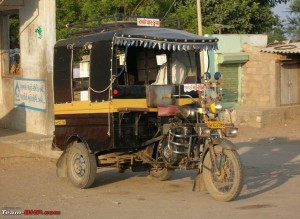Centre for Urban Studies
E-Rickshaws are the latest entry in the Indian road and transport system. A flexible, non-polluting and affordable system, they have been playing a significant role in solving the last mile connectivity issue. Due to the absence of rules and norms, they have been largely operating very informally. While the licensing of E-Rickshaws has been given the nod by the Ministry of Road Transport and Highways, the operation of this system is still ambiguous which has currently led to the ban order by the Delhi High Court.
There exists the issue of monitoring and framing the rule book for E-Rickshaws for the safety and security of the commuters using these systems. Policy guidelines are required on whether E-Rickshaws are an Intermediate Para-Transit (IPT) system, who is responsible for the licensing and regulation and how it gets integrated and act as feeder to the public transport. Specific provisions are required to address questions on speed, vehicle specifications, insurance, lane traffic and fare charges. This requires a policy framework to address the concerns of both e-rickshaw drivers and its counterparts.
Centre for Public Policy Research (CPPR) believes that E-Rickshaw needs to be integrated into the system at the policy as well as at the infrastructure level and developed as an appropriate feeder system. This demands for a need based assessment and defining of IPT Characteristics in the current public transport system of India. This policy brief aims to develop an approach wherein which systems like e-rickshaw shall be formally integrated and devised to support the existing systems and enable a sustained transport system.
Please download the Policy Brief here.. E-Rickshaw





1 Comment
[…] E-Rickshaw bill was passed by Lok Sabha (People’s Assembly) last week setting it clear that Government wanted to push mobility of people to the forefront. E-Rickshaws, quickly gained ground among the people, especially urban poor in cities due to its accessibility, flexibility and affordability. They solved the last mile connectivity issue which has been plaguing transport sector in India. However, due to absence of rules and safety guidelines they were asked to keep off the road by the government through different Court rulings. CPPR has been in the forefront of advocating the need for e-rickshaws under the category of Intermediate Para-Transit (IPT) systems to support urban transport in India. CPPR has always taken the stand that lack of policies and government apathy towards IPTs have not helped the cause of mobility in India. CPPR had been a part of the statewide consultations for introducing IPTs as per Ministry of Road Transport and Highways (MoRTH) directions. CPPR have had undertaken various studies in Chennai and Kochi and submitted Policy Briefs highlighting the importance of IPTs in India and why it is integral to the system. Read our Policy Briefs on this : Intermediate Para-Transit sector in India and E-Rickshaw in India […]